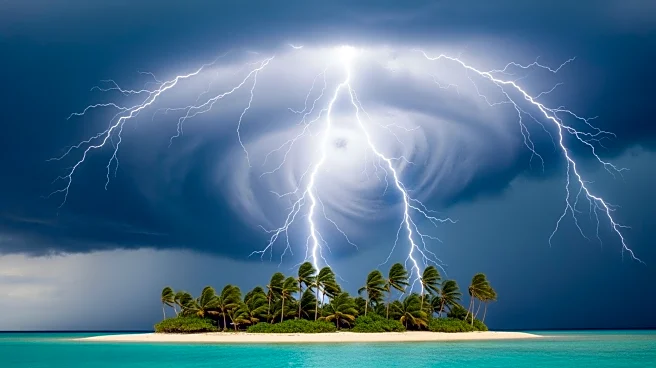What's Happening?
Jamaica is bracing for the impact of Hurricane Melissa, a Category 5 storm that is expected to make landfall soon. The hurricane is predicted to be one of the most violent in the island's history, with
maximum wind speeds reaching 175 miles per hour. The storm has already caused fatalities in Jamaica, Haiti, and the Dominican Republic. Jamaican officials, including Prime Minister Andrew Holness, have urged residents to evacuate to higher ground and shelters, although many shelters remain empty. The Jamaican Red Cross is actively distributing supplies, but the slow-moving nature of the storm is causing significant anxiety among residents.
Why It's Important?
The potential impact of Hurricane Melissa is significant, as it threatens to cause widespread devastation similar to past hurricanes like Maria and Katrina. The storm's slow pace means affected areas could experience prolonged exposure to its destructive forces, leading to extensive infrastructural damage, power outages, and communication disruptions. The hurricane's impact could exacerbate existing vulnerabilities in Jamaica's infrastructure and economy, affecting agriculture, fisheries, and local communities. The situation highlights the increasing frequency and intensity of storms due to climate change, raising concerns about future preparedness and resilience.
What's Next?
As Hurricane Melissa approaches, the focus remains on evacuation and safety measures. The Jamaican government and international aid organizations are likely to intensify their efforts to provide relief and support to affected communities. The storm is expected to move towards eastern Cuba, potentially causing further damage. Long-term recovery efforts will be necessary to address the aftermath, including rebuilding infrastructure and supporting displaced populations. The event may prompt discussions on improving disaster preparedness and climate change mitigation strategies in the region.
Beyond the Headlines
The hurricane underscores the broader implications of climate change, as scientists attribute the increasing severity of storms to human-driven environmental changes. The situation in Jamaica may serve as a case study for the global community on the urgent need for climate action and sustainable development practices. Additionally, the reluctance of some residents to evacuate highlights challenges in public trust and the adequacy of emergency shelters, pointing to areas for policy improvement.








